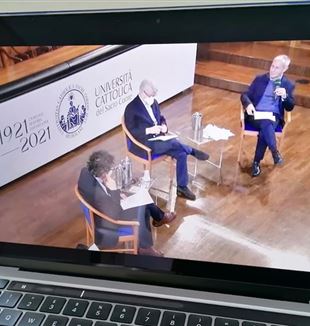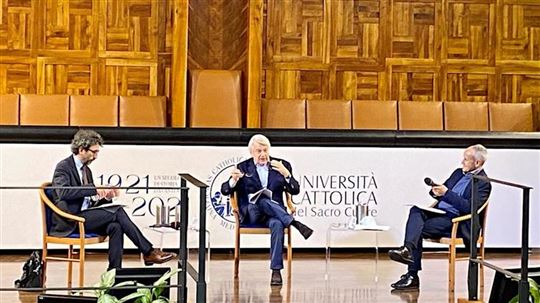
Truffelli-Carrón: "An opportune time for sowing"
The meeting between the president of Azione Cattolica and the leader of CL, moderated by Ferruccio De Bortoli. The key words of their dialogue: the Christian community, politics, synodal Church and freedom.Exceptional problems and the exceptional provocations of the pandemic; paths to re-build fraternity and social friendship, in the light of Pope Francis' encyclical Fratelli tutti. Along this line, a dialogue took place on Thursday, May 14, between the president of Azione Cattolica [Catholic Action] Matteo Truffelli, and the leader of Communion and Liberation, Julián Carrón, moderated by journalist and writer Ferruccio De Bortoli. With his questions and observations, De Bortoli led the conversation in stages (broadcast via live stream from the Catholic University of Milan) to reflect upon four key points: community, politics, freedom and the Church.
On the first point, Fratelli tutti, according to De Bortoli, asks us to take charge of the future of the community (a reality that cannot be absorbed into the State-market binomial) by offering us the antivirus of fraternity. How do we respond? For Truffelli, the pandemic has clearly brought to light the alternative between the principle of fraternity and the virus of individualism, the "individualistic sadness" of which Evangelii Gaudium speaks. Quoting Tocqueville, the president of Azione Cattolica emphasized that "the struggle of all against all makes individuals more easily homologated" by power. On the contrary, it is a matter of "proposing paradigms of fraternity", or rather cultivating - using the words of Edgar Morin - "an oasis of fraternity". "This is the opportune season".
Opportune, yes, agreed Fr. Carrón. The pandemic has strengthened and, in some ways, exasperated individualistic closure, on the one hand, and the need for sociality, on the other; similarly to what has already happened in times of serious crisis, "our individualism is challenged as never before," and we are provoked to realize that "we are, as Francis says, in the same boat." Carrón further noted that "in history, great ruptures also induce the need for unity and can trigger or strongly accelerate unpredictable processes, as was the case at the beginning of the building of Europe with the Czech Republic, after the Second World War." Today, similarly, we see "the selfishness of vaccines" together with an unexpected "scientific collaboration", health, and so on. But, Carrón warned, unity is fragile and provisional. So we must ask ourselves if "by virtue of the newness of Christ we can offer a real contribution to effectiveness and stability. Not with preaching or ethical appeals, but through lived experiences of a more open, fraternal, welcoming, satisfying humanity."
De Bortoli spoke of how he would like to see (second theme) the consequent political commitment of the Catholic world, because "good politics,” he said, quoting the teaching of the Popes, “is a precious form of charity." But he declared himself pessimistic, because "there has been a flight from politics and the voice of the Catholic world is not heard." Truffelli interpreted this differently and invited us to distinguish: "We cannot identify Catholic presence in politics with a form reduced to the visible, to the grouped, to the labelable". Instead, it is a matter of "making good ideas and valid people available to the country and to Europe". The Catholic world has enviable cultural-political "baggage", which must be spent "remembering that politics is the meaning of the whole", which implies not identifying "Catholic" politics with this or that, for example the value of life or the welcoming of migrants, or something else. What is important is that social and political commitment be "a sowing of unity and hope, and not of opposition and distrust, as happens in power politics."
Carrón then invited us to go back to the origin of the matter, because insisting only on the consequences is insufficient. At the origin, we must consider this: that man is by nature an infinite desire for fullness. Therefore, either a real, adequate, experienceable response is offered to this desire, or man will strive to obtain it for himself, individualistically, for example by seeking goods to accumulate or power to exercise. Vice versa "if we can experience a real fullness, we will realize that money, power and whatever else, is too little because it falls short of desire". And he also added, "Selfishness and nihilism are challenged when we see people who attract or make us envious because they truly enjoy life in every circumstance, in an unimaginable way." Hence, initiatives and actions capable of mobilizing others can be born. Those "sparks" of good and unity can become stable virtues. In fact, when we are cornered, we know how to bring out the best, but only if we go to the root, everything does not decay. And we must be careful, because politics, Carrón warned, "projects on the big screen what we are like in daily life." No ideological escapes.
But does not the fact that we are all in the same boat, having to submit to the necessary restrictions to safeguard the community, threaten freedom? This is the third question. To De Bortoli's question, Truffelli responded with Francis, that "freedom and equality are balanced only by fraternity." And he added that the concept of law must be rethought, distinguishing it from the false idea that law coincides with the freedom to impose one's own desire - individual or collective - on others, or on other peoples.
Once again Carrón recalled the value, also pedagogical, of experience. He did so recalling the image of the choir: it is an experience in which the contribution of the individual to the common work does not mortify the ‘I’, but exalts it. Here, "we can learn through experience that the affirmation of the other, in unity, strengthens the affirmation of self; that immersed in a we, the ‘I’ is exalted".
De Bortol raised the last question: the Pope asks the Italian Church to live "synodal paths", that is, of communion and sharing. CL and Catholic Action have lived in dialogue and friendship, but also dialectics and conflicts. What will their future paths be? For Tuffelli, the path is already in place, indeed it has matured over time as an awareness that "difference is richness and not objection". The AC president is at the end of his term, but "I am sure that my successor will continue along this line." The Pope recently urged Azione Cattolica to be "the arena of synodality", which for Truffelli means getting rid "of self-referential clericalism, of abstractness, and rediscovering Baptism.” For the Church, a synodal journey will thus be an opportunity to become aware of itself as a people within the life of a greater people.
Read also - Macerata-Loreto. "Our journey handed over to the Pope"
There is a great protagonist of synodality that must be recognized acknowledged Carrón: "There is no synodality without the Spirit." Unless we identify it, unduly, as a sort of parliament in search of complicated and elaborate agreements on pastoral strategies, as Pope Francis said to Azione Cattolica, Carrón added, "Our ecclesiastical or pastoral ups and downs will not be what defined nihilism or refills empty churches. Synodality will bear fruit if together we begin to listen to what the Mystery arouses, to the novelties it makes happen: facts, experiences, events in which a fullness of correspondence to the profound needs of people is manifest."